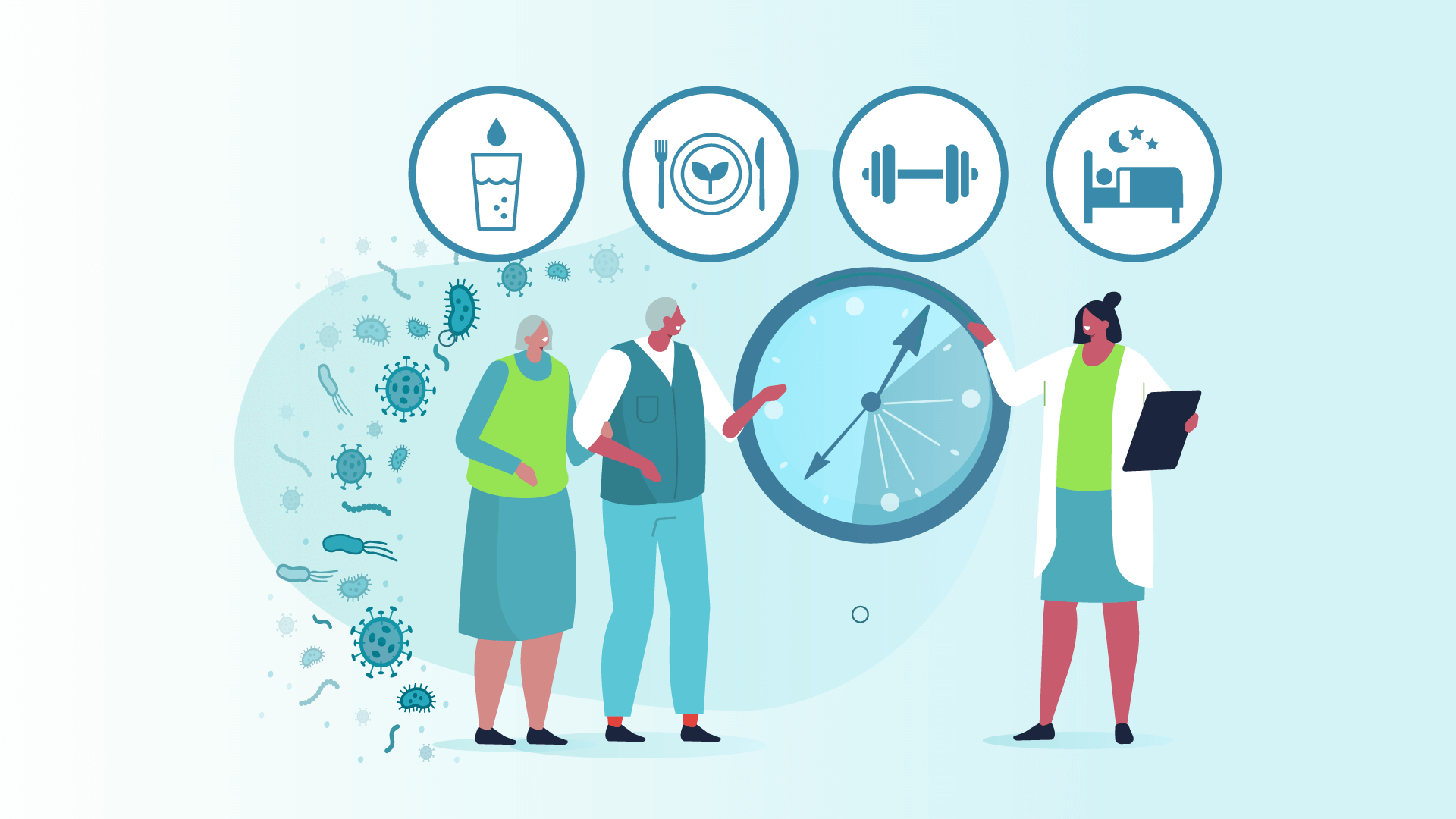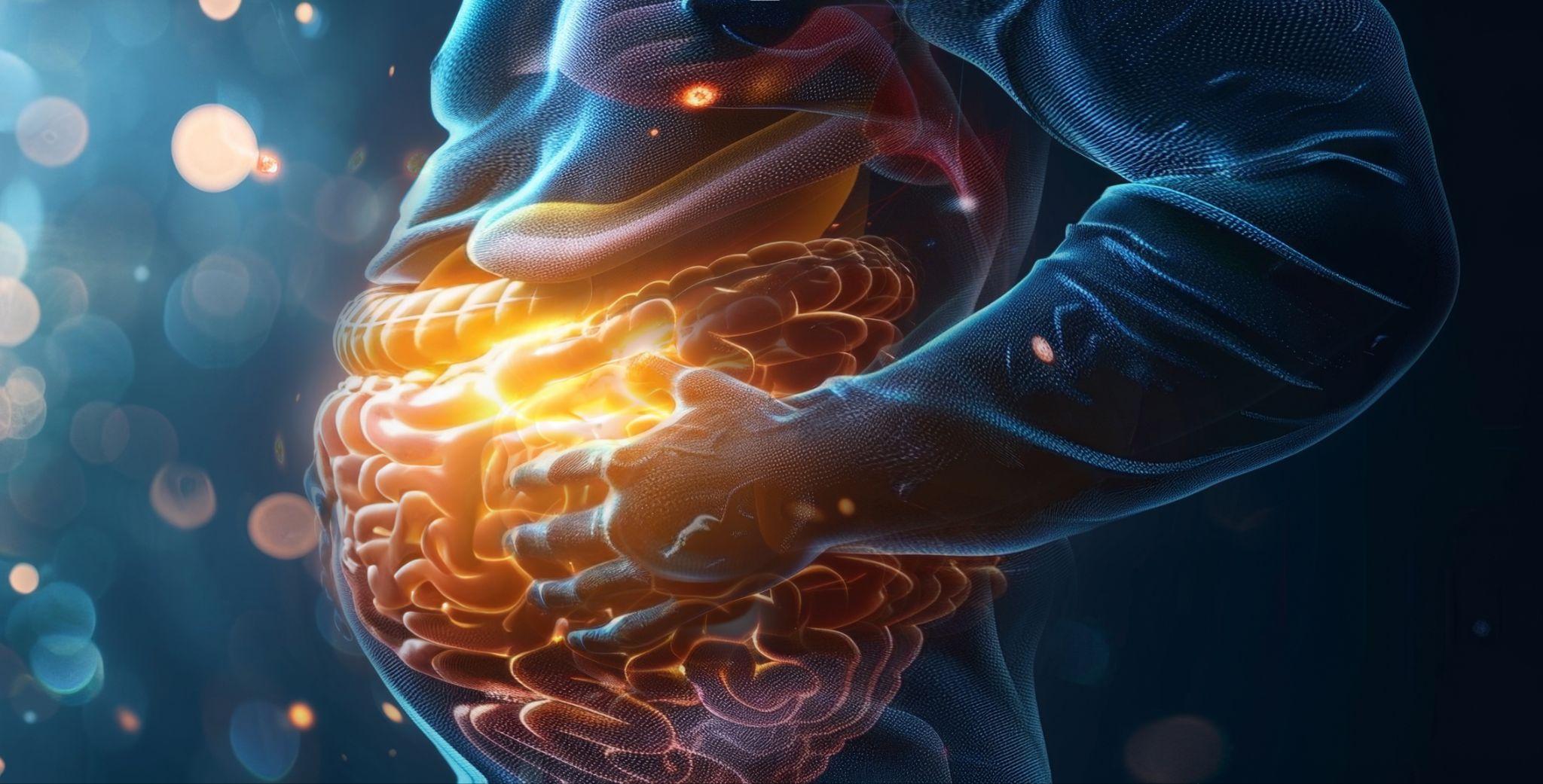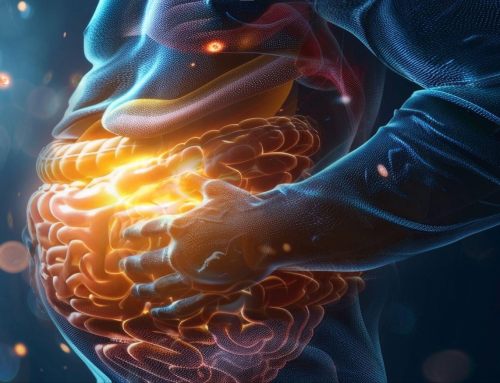Strategies to Reduce Immune Age & Increase Health Span
What if you could become healthier while getting more youthful? Immunity is essential for longevity, and we know now more than ever how true this concept is. The aging immune system is associated with a number of chronic health conditions beyond aging. Implementing daily lifestyle practices that support and optimize the body’s immunity at a cellular level can favorably influence aging, as well as reduce chronic illness (1).
Foundations of Aging & Reduced Immunity
Aging is a biological process, defined as a reduction in cellular function with associated accumulation of damage in the body, specifically to proteins, DNA, and RNA. The hallmarks of aging include molecular changes (such as telomere and mitochondria dysfunction, epigenetic modifications, compromised autophagy, and decline in protein homeostasis), cellular changes (including stem cell exhaustion, cellular senescence, and compromised intercellular communication), and systemic changes like dysregulated nutrient sensing (2).
Genomic instability and mitochondrial dysfunction appear to be the most robust drivers of cellular aging, affecting tissues and body systems.
Aging affects the immune system, and the immune system affects aging. Both innate and adaptive immunity become compromised as the result of aging, as cellular health is affected (3).
What Drives Dysregulated Immunity & Aging?
Insufficient nutrition, gut microbiome health, increased oxidative stress, and inflammation are factors that contribute to dysregulated immune health and aging. Inflammation, in particular, can lead to increased aging as well as compromised immunity, a term coined inflammaging (4). Psychological & emotional stress, poor metabolic or gut microbiome health, and compromised methylation all further cause dysregulation in these pathways.
The Microbiome: The Epicenter of Our Health – Immune system health, including development and functioning efficacy, depends on the diversity and composition of the gut microbiota. More than 70% of the immune system is located in the gastrointestinal (GI) tract. The gut modulates immunity via the production of metabolites from the foods we consume (5) as well as other exposome factors such as stress, sleep, and exercise. Further environmental exposures, including air pollution and medications (such as antibiotics), affect the composition of the gut microbiome (6). All of these factors can also compound any existing thyroid issues, or contribute to an imbalance, thereby affecting metabolism, immune health, aging, and mood.
Food Allergies & Sensitivities – Food sensitivities or allergies initiate an inflammatory response in the body that can also affect immune system health, cause alterations in the gut microbiome, and lead to inflammation and oxidative stress in the body. In particular, these conditions may be immune-mediated (7).
Mitochondrial Dysfunction – Mitochondrial dysfunction, coupled with genomic instability, have been suggested to be key drivers of oxidative stress, resulting in DNA damage response pathways and inflammation in the body, all of which compromise immunity and cellular health, leading to aging.
Compromised Autophagy & Mitophagy – Autophagy or cellular detox and renewal, as well as mitophagy (a specific form of autophagy), regulates the renewal of cells and their mitochondria that are damaged or otherwise dysfunctional.
All Forms of Stress – Emotional and psychological stressors can also affect the immune system and compound issues with inflammation and oxidative stress in the body. The field of Psychoneuroimmunology (PNI) studies the interconnectedness of the nervous system, emotional stress, and immune health. This explains why we are more prone to get sick when we are stressed out or emotionally drained.
How to Support Immune Health & Longevity: The Role of Nutrition & Lifestyle
Food is Information, Epigenetics
Food or the absence of food is correlated with aging and is also information for our body in terms of immunity. Nutrition regulates a number of biological pathways that have to do with longevity and immune function. Epigenetics highlights how our genes can be favorably influenced by nutrition and lifestyle.
Nutrients, including Selenium, Zinc, Vitamin D, Vitamin A, and Vitamin C, and a high intake of bioactive compounds from plants have all been shown to promote increased health span and improved immunity. Fatty acids (Omega 3s) and amino acids from high-quality proteins all support immune system health as well as increased longevity (8). Further vitamins and antioxidants such as Vitamin E, NAC, glutathione, and quercetin have also been suggested to aid in these processes. Notably, these antioxidants have been found to prolong lifespan as well as improve immunity. This is important as oxidative stress (ROS) can affect cellular health and therefore compromise immune function and age.
Glutathione, in particular, has also been found to play a pivotal role in these processes of aging and immune health, including regulation of immune health, detoxification, and oxidative stress (9). What’s more, is that this can help combat environmental toxins such as air pollution or other cellular insults.
Eating in accordance with an anti-inflammatory diet is important as cytokines play an integral role in compromising immune health and aging. Obtaining foods that support healthy methylation is also important, as this process aids in DNA repair, in addition to other vital processes for health and vitality. Methylation becomes compromised with age and without sufficient means of nutrition. Nutrient-rich sources of B12, choline, and betaine are great ways to support methylation. Eggs, poultry, and spinach are excellent sources of these nutrients.
Refraining from processed foods and refined carbohydrates is also important, as these lead to inflammation and wreak havoc on processes of the body that affect immune health and aging.
Promote Cellular Renewal: IF & Carbohydrate Restriction
Intermittent Fasting (IF) and refined carbohydrate restriction have been suggested to play roles in modulating immune health and longevity as these promote autophagy. Intermittent Fasting promotes autophagy, providing cellular renewal or detoxification and anti-aging benefits. Autophagy supports aging as it is cleansing for cellular or mitochondrial health. This process has been found to have a pivotal role in immune health, inflammation, and aging (10).
Boost Mitochondrial Health: The Power of Plants
Adding bioactive plant compounds can support processes of immunity and longevity via modulation of metabolism, mitophagy, immune signaling pathways, and regulation of circadian rhythm (11). Increasing intake of phytochemicals, the properties that make up plants, also supports fiber and antioxidants.
A ketogenic, high antioxidant, anti-inflammatory way of eating, rich in flavonoids, low glycemic, low grain, and gluten-free may be recommended, as this supports pathways in the body that promote cellular and immune health. This nutrient-dense diet also increases the production of brain-derived neurotrophic factor (BDNF) – helping to modulate inflammation, gut microbiome, and immune health, in addition to healthy aging. Following this way of eating also supports healthy mitochondrial functioning, therefore supporting energy production in the cells. This type of nutrient-packed diet additionally optimizes and enhances the function of the cells, supporting graceful aging. Adhering to a whole foods lifestyle also supports a reduction in the production of reactive oxygen species (ROS) that can otherwise damage cells. For further health-boosting benefits, adding the spice turmeric to foods has both inflammatory and immune-modulating properties.
The nutrient density of this diet, coupled with carbohydrate restriction, and intermittent fasting, has been suggested to best support aging and immune health. An example of this way of eating includes dark green leafy vegetables, quality sources of protein (such as fresh salmon, pasture-raised eggs and chicken, or grass-fed beef), low-sugar fruits, and healthy fats (including avocados, almonds, brazil nuts, chia seeds, and ground flaxseeds).
Getting Back to Our Roots: Ancestral & Cultured Foods
Adding in fermented foods, including natural sources of prebiotics and probiotics such as kimchi, pickles, artichokes, garlic, live yogurt, and bananas, is greatly recommended as these support the gut microbiome – promoting regulation of all aspects of health (13). In particular, these cultured foods have been suggested to promote immune health and longevity.
Adequate Hydration, Sunlight, & Quality of Zzzs
Adequate hydration is imperative for cellular health and function, as is exposure to sunlight and sufficient sleep. All of these practices also aid the body in detoxification and promote immunity. Good quality sleep is vital for immune function, gut microbiome health, and the modulation of inflammation and immunity. REM sleep, in particular, is especially helpful for cellular and immune health, as well as to combat aging (12).
Movement for Flow, Immunity, & Youth
The right amount of exercise is important for the functioning of the immune system via modulation of white and red blood cells, as well as cytokines. Exercise also has anti-inflammatory and gut-microbiome regulation properties. Furthermore, exercise promotes lymphatic flow and autophagy, supporting the body with detoxification, cellular function, immune health, and stress reduction (14).
Adaptive Forms of Stress
Hormesis, known as short induced periods of stress, can also support immune health and healthy aging (3). These practices may include the use of the sauna before dipping into a cold plunge.
Social Health
Social connections are also integral to immune function, while modulating aspects of healthy aging. Social isolation, on the other hand, can wreak havoc on our immune system and stress response.
The Role of Breath
Oxygen is vital for the functioning of our cells. There has been a connection with cellular death and accumulation of damage resulting from hypoxia (reduced concentrations of oxygen). This can lead to accelerated aging as well as compromised immune health. Mindful breathing through the nose, with a longer exhale, can have supportive functions on the body and mind. Deep breathing can also support the lymphatic system helping to transport toxins into the blood prior to detoxification in the liver.
Can We Reset Immune Health?
While we can’t reset the clock in terms of aging, we can, to a certain extent, reset our immune system, which has significant impacts on healthy aging and longevity.
Join us for this free virtual event occurring on December 5th from 5:30 to 7 p.m. PST, as we further explore this intriguing topic.
Experts will include Jeffry Bland, PhD, discussing Immune Aging & Epigenetics, Mark Hyman, MD, reviewing the breakthroughs in longevity science, Austin Perlmutter, MD, speaking on nutrition and plant compounds in immune rejuvenation, and finally, Robert Silverman, DC, on the power of unlocking longevity potential with an immune system reboot.
You won’t want to miss this wealth of clinical knowledge with valuable implications for practice.
References:
- Niccoli T, Partridge L. Ageing as a risk factor for disease. Curr Biol. 2012 Sep 11;22(17):R741-52. doi: 10.1016/j.cub.2012.07.024. PMID: 22975005.
- Guo, J. , Huang X, Dou L. & Yan M. (2022). Aging and aging-related diseases: from molecular mechanisms to interventions and treatments. Signal Transduction and Targeted Therapy, 7, (1).
- Csaba G. Immunity and longevity. Acta Microbiol Immunol Hung. 2019 Mar 1;66(1):1-17. doi: 10.1556/030.65.2018.029. Epub 2018 Jul 3. PMID: 299684
- Cosola C, Rocchetti MT, Gesualdo L. Gut Microbiota, the Immune System, and Cytotoxic T Lymphocytes. Methods Mol Biol. 2021;2325:229-241. doi: 10.1007/978-1-0716-1507-2_16. PMID: 34053062.
- Chen F., Stappenbeck T.S. Microbiome control of innate reactivity. Curr. Opin. Immunol. 2019;56:107–113. doi: 10.1016/j.coi.2018.12.003.
- Vineis P., Robinson O., Chadeau-Hyam M., Dehghan A., Mudway I., Dagnino S. What is new in the exposome? Environ. Int. 2020;143:105887. doi: 10.1016/j.envint.2020.105887.
- Rotondi Aufiero V, Fasano A, Mazzarella G. Non-Celiac Gluten Sensitivity: How Its Gut Immune Activation and Potential Dietary Management Differ from Celiac Disease. Mol Nutr Food Res. 2018 May;62(9):e1700854. doi: 10.1002/mnfr.201700854. Epub 2018 Apr 20. PMID: 29578652._____
- Calder PC. Foods to deliver immune-supporting nutrients. Curr Opin Food Sci. 2022 Feb;43:136-145. doi: 10.1016/j.cofs.2021.12.006. Epub 2021 Dec 18. PMID: 34976746; PMCID: PMC8702655.
- Minich DM, Brown BI. A Review of Dietary (Phyto)Nutrients for Glutathione Support. Nutrients. 2019 Sep 3;11(9):2073. doi: 10.3390/nu11092073. PMID: 31484368; PMCID: PMC6770193.
- Levine B, Mizushima N, Virgin HW. Autophagy in immunity and inflammation. Nature. 2011 Jan 20;469(7330):323-35. doi: 10.1038/nature09782. PMID: 21248839; PMCID: PMC3131688.
- Aguilar-López BA, Moreno-Altamirano MMB, Dockrell HM, Duchen MR, Sánchez-García FJ. Mitochondria: An Integrative Hub Coordinating Circadian Rhythms, Metabolism, the Microbiome, and Immunity. Front Cell Dev Biol. 2020 Feb 7;8:51. doi: 10.3389/fcell.2020.00051. PMID: 32117978; PMCID: PMC7025554.
- Wang Z, Wang Z, Lu T, Chen W, Yan W, Yuan K, Shi L, Liu X, Zhou X, Shi J, Vitiello MV, Han Y, Lu L. The microbiota-gut-brain axis in sleep disorders. Sleep Med Rev. 2022 Oct;65:101691. doi: 10.1016/j.smrv.2022.101691. Epub 2022 Aug 31. PMID: 36099873.
- Boyajian JL, Ghebretatios M, Schaly S, Islam P, Prakash S. Microbiome and Human Aging: Probiotic and Prebiotic Potentials in Longevity, Skin Health and Cellular Senescence. Nutrients. 2021 Dec 18;13(12):4550. doi: 10.3390/nu13124550. PMID: 34960102; PMCID: PMC8705837.__
- Wang J, Liu S, Li G, Xiao J. Exercise Regulates the Immune System. Adv Exp Med Biol. 2020;1228:395-408. doi: 10.1007/978-981-15-1792-1_27. PMID: 32342473.












